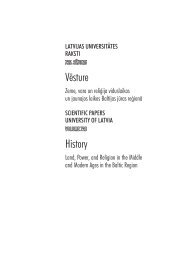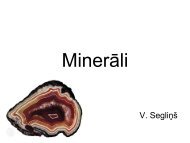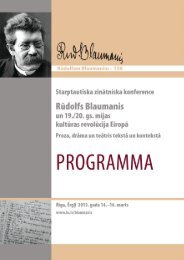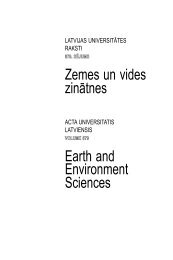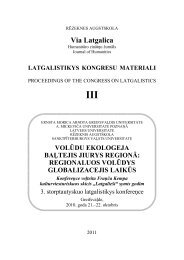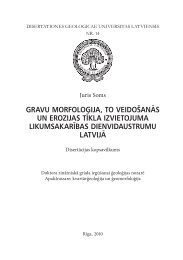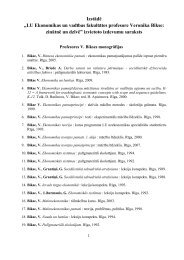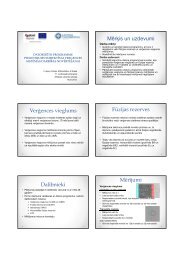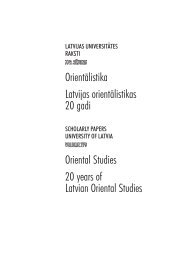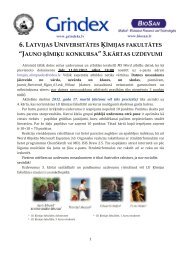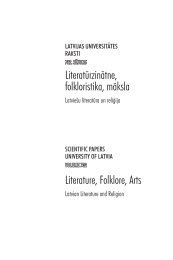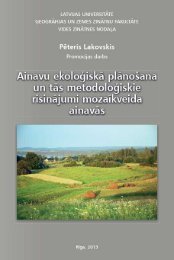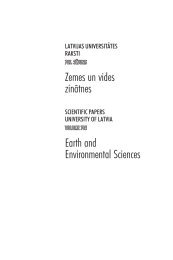Untitled
Untitled
Untitled
You also want an ePaper? Increase the reach of your titles
YUMPU automatically turns print PDFs into web optimized ePapers that Google loves.
Gunnar Arrias. Vai Tomasa Stçrna Eljota mçría korelatîvs ir obligâti vîrieðu korelatîvs?<br />
[W]ith every fresh volume […] Frazer has withdrawn in more and more<br />
cautious abstention from the attempt to explain […] It is a work of no<br />
less importance for our time than the complementary work of Freud […]<br />
and it is a work of perhaps greater permanence, because it is a statement<br />
of fact which is not involved in the maintenance or fall of any theory of<br />
the author’s. 17<br />
225<br />
But Frazer is a typical representative of “positivist” reductionism regarding religion<br />
as some sort of primitive science which has long ago been superseded by real<br />
science! Reviewing a violently abridged edition of Frazer’s work, Eliot obviously<br />
distorts the picture of what Frazer aimed at achieving. As Richard Wollheim has remarked,<br />
there is in Eliot a fear of the intellect. 18 An aspect of this fear is Eliot’s hostility<br />
towards explanation or interpretation.<br />
There is a shyness–theory to explain Eliot’s repudiation of the expression of<br />
personality as well as of creative interpretation. Of more general interest I find an<br />
explanation that considers the ethical and religious restrictions on the expressing of<br />
personality. Why does Eliot repudiate explanation or interpretation within the humanities?<br />
Well, explanation or interpretation within the humanities tend to be projective<br />
or expressive on a par with artistic self–expression. Interpretation or explanation<br />
within, say, psychology, religion and ethics tend to promulgate your own convictions<br />
in these areas. Correspondingly, and this I think is most pertinent in Eliot’s case, they<br />
risk challenging your own convictions and ideals. Interpretation or explanation came<br />
to represent a “modernist” threat to Eliot’s personal convictions and to his upholding<br />
of the notion of tradition. When Eliot in 1913 started attending the philosopher Josiah<br />
Royce’s seminar he had earlier that year produced a “paper” which concludes that<br />
the attempt at reducing “ethics to a logical science (as well as the modern attempt to<br />
reduce it to a biological science) must end in partial failure”. Müller, Tylor and Frazer<br />
as well as the French sociologists Durkheim and Lévy–Bruhl seemed to Eliot to<br />
threaten “the very existence of religious beliefs”. 19<br />
Just as Eliot praises Frazer’s pure descriptions or statements of fact (in the same<br />
breath as he condemns Freudian explanation or interpretation) he repudiates the interpretation<br />
of works of art in favour of “the presentation of relevant historical facts”.<br />
Interpretation of Hamlet would lead Eliot not only to “the inexpressibly horrible” but<br />
to his “inexpressibly horrible”. But obviously Eliot is unable to uphold his anti–<br />
interpretationalist stance.<br />
What I’m driving at here has been illuminatingly caught in David Spurrs Conflicts<br />
in Consciousness: T.S. Eliots Poetry and Criticism (1984):<br />
Eliot’s elaborate display of objectivity [...] may momentarily divert our<br />
attention from the strong undercurrent of fear and violence that runs<br />
through the essay “Hamlet and his problems” [...] Eliot really wants a<br />
better defence against the forces of madness that surface only too clearly<br />
in Shakespeare’s play [...] Eliot offers his notion of the objective correlative<br />
as a possible means of controlling these dark powers [...] as a<br />
defence against his personal involvement in the struggle he ascribes to<br />
Hamlet. 20



